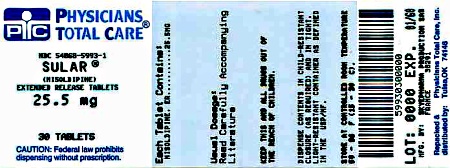
Sular | Nisoldipine Tablet, Film Coated, Extended Release while Breastfeeding
What is Sular | Nisoldipine Tablet, Film Coated, Extended Release used for?
Is Sular | Nisoldipine Tablet, Film Coated, Extended Release safe to use while breastfeeding? Can it interfere with growth and development of my kid?

Nursing Mothers It is not known whether nisoldipine is excreted in human milk. Because many drugs are excreted in human milk, a decision should be made to discontinue nursing, or to discontinue SULAR, taking into account the importance of the drug to the mother.
Sular | Nisoldipine Tablet, Film Coated, Extended Release Breastfeeding Analsys
Nisoldipine while Breastfeeding
Low RiskCAS Number: 63675-72-9
At latest update no published data were found on excretion into breast milk. Evidence on other antihypertensive drugs of the same family with similar structure, pharmacokinetics and action profile (nifedipine, nimodipine, nicardipine) has shown that they are excreted into milk in non-significant amount.Its high plasma protein binding capacity makes it highly unlikely a passage into milk.A low oral bioavailability hinders the passage from ingested milk toward the infant’s plasma except in case of premature babies and/or in the immediate neonatal period, in which an increased intestinal permeability may appear. Until more extensive published data about this drug regarding breastfeeding are available a safer alternative drug should be used, especially during the neonatal period and/or in case of premature infants.
Sular | Nisoldipine Tablet, Film Coated, Extended Release Breastfeeding Analsys - 2
Nisoldipine while Breastfeeding
CAS Number: 63675-72-9
Because no information is available on the use of nisoldipine during breastfeeding, an alternate drug may be preferred.
I am nursing mother and I have already used Sular | Nisoldipine Tablet, Film Coated, Extended Release, what should I do?
Sular | Nisoldipine Tablet, Film Coated, Extended Release is in the category of low risk, if you have already used it then its not a big deal if health and behavior of baby is good. However your health care provider shall be aware of the fact that you have used Sular | Nisoldipine Tablet, Film Coated, Extended Release so you should inform him based on your convenience.
My health care provider has asked me to use Sular | Nisoldipine Tablet, Film Coated, Extended Release, what to do?
Though Sular | Nisoldipine Tablet, Film Coated, Extended Release dose not comes in category of safe drugs rather it comes in category of low risk but if your doctor is aware that you are breastfeeding your baby and has still recommended it then its advantages must be outweighing the risks.
If I am using Sular | Nisoldipine Tablet, Film Coated, Extended Release, will my baby need extra monitoring?
Not much monitoring required while using Sular | Nisoldipine Tablet, Film Coated, Extended Release
Who can I talk to if I have questions about usage of Sular | Nisoldipine Tablet, Film Coated, Extended Release in breastfeeding?
US
National Womens Health and Breastfeeding Helpline: 800-994-9662 (TDD 888-220-5446) 9 a.m. and 6 p.m. ET, Monday through Friday
UK
National Breastfeeding Helpline: 0300-100-0212 9.30am to 9.30pm, daily
Association of Breastfeeding Mothers: 0300-330-5453
La Leche League: 0345-120-2918
The Breastfeeding Network supporter line in Bengali and Sylheti: 0300-456-2421
National Childbirth Trust (NCT): 0300-330-0700
Australia
National Breastfeeding Helpline: 1800-686-268 24 hours a day, 7 days a week
Canada
Telehealth Ontario for breastfeeding: 1-866-797-0000 24 hours a day, 7 days a week
